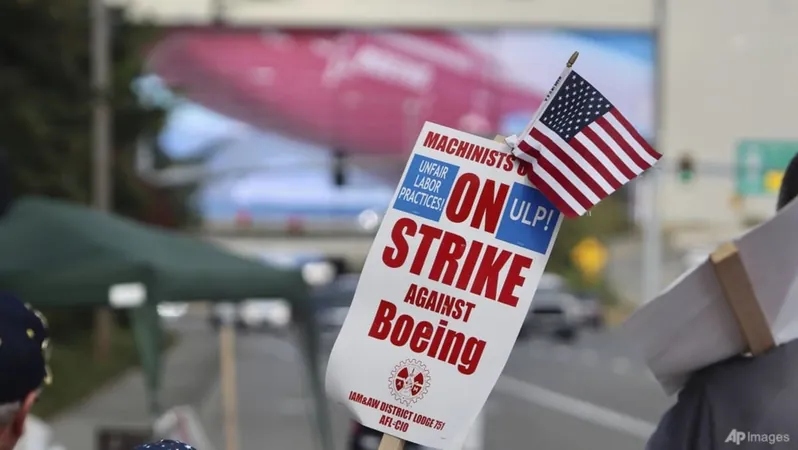
Boeing's New Pay Proposal Sparks Outrage Among Striking Workers
2024-09-24
Author: Rajesh
Introduction
Boeing’s latest offer to increase hourly wages for striking workers by 30% has drawn sharp criticism from union negotiators, who argue that it fails to meet the needs and concerns of their members. On September 23, union representatives described the proposal as having “missed the mark” and announced that it would not be put to a vote among the workforce.
Union's Response
In a statement to union members, negotiators expressed their discontent, stating, “This proposal does not go far enough to address your concerns, and Boeing has missed the mark with this proposal.” They emphasized that the company’s approach appears to be a tactic to create division within the ranks of the workers, undermining the solidarity that has been pivotal to their collective action.
Background of the Negotiations
Boeing has made this revised offer in a bid to resolve a 10-day strike that has resulted in the closure of several key assembly plants in the Seattle area. A company spokesperson stated, “We have bargained in good faith with the International Association of Machinists and Aerospace Workers (IAM) since formal negotiations began in March,” and set a tight deadline for workers to ratify what they called their “best and final offer” by midnight on Friday.
Timeframe and Responses
Union leaders responded by declaring that the timeframe provided by Boeing for discussion and voting was insufficient, asserting, “The company has refused to meet for further discussion; therefore, we will not be voting.” Instead, they have opted to collect feedback from their members regarding the offer.
Scope of the Strike
The strike involves approximately 33,000 IAM members from District 751 in the Pacific Northwest, who walked off the job on September 13 after decisively rejecting a prior pay offer. The new 30% wage increase is an improvement over the earlier offer of 25%, which had initially been supported by IAM leadership yet was overwhelmingly turned down by rank-and-file members. Workers are pushing for a substantial 40% increase due to what they describe as over a decade of stagnant wages that have not kept pace with rising living costs in the region.
Other Aspects of the Proposal
Besides the wage hike, the new proposal also reinstates an annual bonus that had been omitted previously, a move welcomed by workers who felt the prior offer did not amount to the promised pay increase. Additionally, Boeing has doubled the ratification bonus to $6,000 and improved its contributions to employees' 401(k) plans. However, the amended offer does not address demands for the reinstatement of a pension plan, a key issue for many union members.
Negotiation Efforts
Throughout last week, negotiations included two days of mediation with government officials, highlighting the seriousness of the situation. Boeing's CEO, Kelly Ortberg, labeled ending the strike as “a top priority,” but the repeated refusal to fully meet workers' demands has created a tense atmosphere.
Union Leaders' Statements
IAM President Brian Bryant stated that the latest offer from Boeing validates the strike's decision, adding that employees knew the company could deliver better compensation. Many workers, including Boeing employee Mike Corsetti, expressed cautious optimism about the offer, acknowledging it is an improvement but still uncertain whether it is sufficient.
Complications from the Strike
To compound issues, the strike has further complicated Boeing’s troubles as the company is already under scrutiny from federal regulators due to ongoing safety concerns. Federal Aviation Administrator Mike Whitaker is scheduled to face congressional hearings this week focusing on the agency’s oversight of Boeing, which could bring additional challenges for the troubled aviation giant.
Market Reactions
The repercussions of the strike are already evident, with Boeing shares experiencing a modest rise of 2% at the close of the trading day, even as the company navigates through a turbulent landscape of labor disputes and regulatory challenges.
Conclusion
Will the union's resolve hold strong against Boeing’s latest proposal, or will a compromise eventually emerge? Stay tuned as the situation unfolds!





 Brasil (PT)
Brasil (PT)
 Canada (EN)
Canada (EN)
 Chile (ES)
Chile (ES)
 España (ES)
España (ES)
 France (FR)
France (FR)
 Hong Kong (EN)
Hong Kong (EN)
 Italia (IT)
Italia (IT)
 日本 (JA)
日本 (JA)
 Magyarország (HU)
Magyarország (HU)
 Norge (NO)
Norge (NO)
 Polska (PL)
Polska (PL)
 Schweiz (DE)
Schweiz (DE)
 Singapore (EN)
Singapore (EN)
 Sverige (SV)
Sverige (SV)
 Suomi (FI)
Suomi (FI)
 Türkiye (TR)
Türkiye (TR)